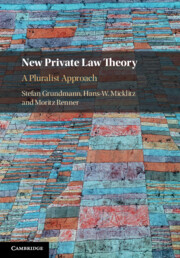Book contents
- New Private Law Theory
- New Private Law Theory
- Copyright page
- Contents
- Preface
- New Private Law Theory
- Part I Methods and Disciplines
- Part II Social Ordering, Constitutionalism and Private Law
- Part III Transactions and Risk: Private Law and the Market
- Part IV Persons and Organizations
- Part V Private Law (Rule-Setting) beyond the State
- 23 Law as a Product
- 24 Multilevel Governance and Economic Constitution
- 25 Transnational Law
- 26 Private Ordering
- 27 The Shadow of the Law and Social Embeddedness
- Index
- References
27 - The Shadow of the Law and Social Embeddedness
from Part V - Private Law (Rule-Setting) beyond the State
Published online by Cambridge University Press: 09 April 2021
- New Private Law Theory
- New Private Law Theory
- Copyright page
- Contents
- Preface
- New Private Law Theory
- Part I Methods and Disciplines
- Part II Social Ordering, Constitutionalism and Private Law
- Part III Transactions and Risk: Private Law and the Market
- Part IV Persons and Organizations
- Part V Private Law (Rule-Setting) beyond the State
- 23 Law as a Product
- 24 Multilevel Governance and Economic Constitution
- 25 Transnational Law
- 26 Private Ordering
- 27 The Shadow of the Law and Social Embeddedness
- Index
- References
Summary
This chapter concludes the section on rule-setting and ‘private law beyond the state’. With this concept, the question is also raised as to whether particular areas de facto constitute or even should constitute a sphere ‘outside the law’. One of the most striking examples in this respect can be found with the Internet and in particular with clashes of opinion in the digital sphere (see also Chapter 16). The most direct conflict might well be that of hate speech (and other insults, threats etc.)
- Type
- Chapter
- Information
- New Private Law TheoryA Pluralist Approach, pp. 495 - 516Publisher: Cambridge University PressPrint publication year: 2021

